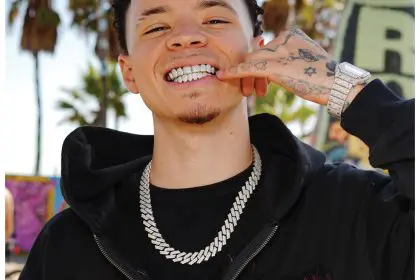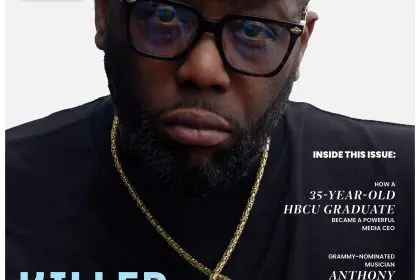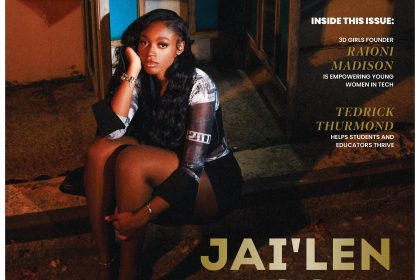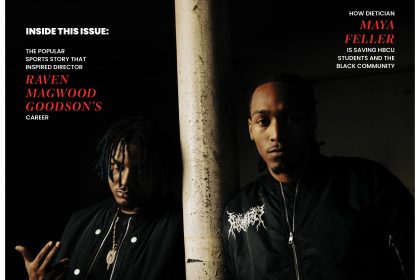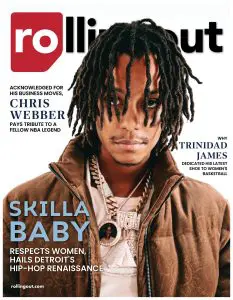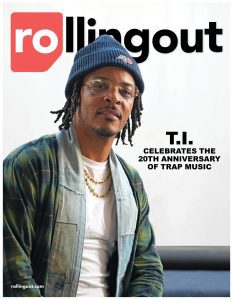
Big K.R.I.T. won’t apologize for what he’s about to do. Dressed in all black with a small gold Jesus-piece draped around his neck, K.R.I.T. places a gold and diamond-encrusted crown atop his head while at White Diamond Imaging studios in Atlanta.
The crown served as more than a wardrobe prop, it was a visual centerpiece to K.R.I.T.’s ambitious declaration. The Meridian, Mississippi, native now believes that he is the true “King of the South.”
But while any rapper could proclaim himself “King,” hip-hop fans must decide if it fits the emcee who hopes to wear the crown. Hours after he donned the gold crown for this edition’s cover, a capacity crowd filled The Masquerade concert hall in Atlanta to witness K.R.I.T. perform the last show of his Pay Attention tour.
After Big K.R.I.T. performed, concertgoers had their say. Once the music stopped, nearly 2,000 fans chanted “King of the South” repeatedly in unison.
Indeed, it was a defining moment that proved Big K.R.I.T. may have legitimate reasoning for proclaiming himself the new wearer of the crown.
Unless you have been totally oblivious to hip-hop in the last 15 years, it’s widely known that T.I. has claimed the “King of the South” moniker. Big K.R.I.T. doesn’t intend to step on any toes, but he believes that this is his time to sit on the throne.
“Coming off of ‘Mt Olympus,’ that was my mind[set],” Big K.R.I.T. said of his decision to proclaim himself “King of the South.” “It was me taking it a step further. It was understanding and feeling that I’m confident in the music I make now and what I’m going to a be doing later on and the quality. Especially on Cadillcactica. I created the planet, why wouldn’t I be the ‘King of the South’? For me, that’s just the beginning of my reign and what I’m trying to do musically. I let everybody know it’s not me trying to step on any OG’s toes and be pitted against anybody. I’m supposed to feel that way. My rap name K.R.I.T. means King Remembered in Time. So people have always called me a king. But now is the time for me to step up and take it further.”
From a lyrical standpoint, Big K.R.I.T. can face off with any rapper of his generation. But to become a true King of the South, he must garner overall respect from the region and remain consistent, like Southern greats such as OutKast, UGK, Scarface, 8 Ball & MJG, Goodie Mob and T.I. He must represent Southern culture while making his vision more accessible to those who’ve never traveled below the Mason-Dixon Line.
“I have to keep making timeless music,” K.R.I.T. says. “Music is the only language that everybody speaks. Before I got in this position, it was always about the music. Just because I got that title [King of the South], that’s just me believing in myself as a man and musician. Everybody should feel like they are a king or a queen at what they do. For me, it’s about putting out the kind of music that heals people, still inspires people to follow their dreams. Getting out in this community and doing as much as I possibly can. Because in the beginning, you’re on the road and touring because you’re trying to get the buzz and get people aware. But I’m at a point where I’m like, let’s just give back and make sure I give other people the opportunity in this music game and let’s spread the love because it’s plenty of it out here.”
Big K.R.I.T.’s biggest obstacle to being king probably won’t come in the form of opposition from another rapper. Most emcees who have held the status of being a king in rap have hailed from a major city. A city’s landscape and community play a major role in how a rapper reveals his life on record.
Big K.R.I.T. was raised in Meridian, Mississippi, which is a town of only 40,000 residents. As a result, Big K.R.I.T.’s story could be overlooked considering that many people outside of Mississippi aren’t necessarily concerned about what happens in Meridian.
“Hip-hop has always been about artists saying, ‘let me tell you about where I’m from,’ ” he says. “Being from Mississippi, it is really hard to get people to go there and that’s not even considering rap. So imagine my city only has 41,000 people in it. So when I talk about 8th Street in Meridian, only roughly 41,000 people know what I’m talking about it. Also, it’s not a vacation destination, so people don’t want to immediately go there. Geographically, you run into this pocket where how do you make people want to go to where you’re from?”
Beyond the fact that Mississippi artists have an issue with gaining mainstream exposure, the state is also viewed by a lot of outsiders for its tumultuous racist past. The state continues to suffer from high poverty rates and Slate recently published an article (“Mississippi’s Race to the Bottom”) that reveals how Mississippi’s racist history continues to haunt its citizens today.
Big K.R.I.T. witnessed racist attitudes firsthand, but he also knows that his state has more to offer than what is displayed in the media.
“There is a big difference between Mississippi and a lot of other places in that if somebody doesn’t like you, you know they don’t like you,” he says. “It’s obvious and there is no doubt about it. There isn’t any beating around the bush, so it allows you to maneuver past that and get away from it. In another state, someone may not like you for your skin tone or your religion and they won’t say anything, but they’ll mistreat you in other ways. That’s something I can’t respect. If you don’t like me and you let me know, then I’ll know not to mess with you. But Mississippi is one of those places where you have Southern hospitality and people are eager to show you it’s not what you see on television.”
Although there are negative aspects of being a rapper from Mississippi, Big K.R.I.T. embraces the underdog role and uses it to fuel him in his quest for respect in hip-hop. The aggressive “Mt. Olympus” was Big K.R.I.T.’s attack on the naysayers who question if Southern rappers lack lyrical abilities while mainstream rappers show disregard for small-town rap fans.
He used that same combative approach while creating his latest project, Cadillactica. From a lyrical and conceptual standpoint, it’s arguably the most cohesive hip-hop album since Kendrick Lamar’s Good Kid: M.A.A.D City.
“With Cadillactica, I wanted to keep that grit and that passion for music,” he says. “Now let’s build this planet, and on this planet things are a little different, a little obscure, but I can be as creative as I want to be. That was the whole goal. I felt like I was able to make the kind of album that isn’t like any of my other projects. Something I can be proud of, but it shows growth at the same time. I didn’t sacrifice any of my integrity on this album. I was literally able to tell an entire lifespan on wax and that’s why I had to feel like it’s a planet. I don’t want to be a part of a certain kind of genre or box because I know how far I can take my music now.”
There are great intentions to Big K.R.I.T.’s approach to being the “King of the South.” But the true test for a rap king is how he is defined by the next generation and how he stakes up against those who came before him. OutKast’s Aquemini, UGK’s Ridin’ Dirty, 8 Ball & MJG’s Coming Out Hard, Scarface’s The Diary, and T.I.’s Trap Muzik are a few Southern hip-hop masterpieces that are still respected by fans who were babies when those projects were released.
So as Big K.R.I.T. places the crown on his head with confidence, it may take years for the rest of us to know if it was truly a good fit.
“I want people to say my music was timeless,” Big K.R.I.T. says. “It needs to always evokes emotion. It must always put you in the same place it did when it first came out. I want my music to outlive me in general. Marvin Gaye made ‘Mercy, Mercy Me’ for what was going on during that era, but it transcended time. The same with Sam Cooke’s ‘A Change is Gonna Come.’ His music transcended the time and became a staple for people in general. I make music with the mindset of, ‘if this is the last song I created and the last project, I pray that I did enough.’ I pray that I gave enough content and positivity that somebody could hear this and it helps them get to the next step in life 15 to 20 years from now. Lord willing.”

